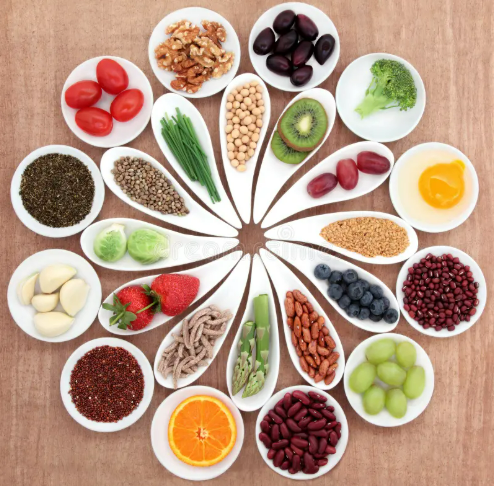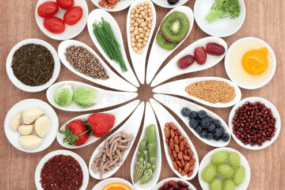
In a world full of dietary trends, fad diets, and flashy nutrition claims, it’s easy to get swept up in misinformation about food. One day eggs are the enemy, the next they’re a superfood. Carbs go from essential fuel to waistline saboteurs overnight. It’s confusing—and often misleading. Nutrition is complex, but with science-backed information, we can clear up some of the most common food myths and get to the truth about what we’re really putting on our plates.
Let’s dive into the most persistent food myths and what you actually need to know to make informed, healthy choices.
Myth #1: Carbs Make You Gain Weight
The Truth:
Carbohydrates have long been blamed for weight gain, but this isn’t entirely accurate. Weight gain occurs when you consume more calories than your body burns, regardless of the source. Carbs are not inherently fattening; in fact, they’re a primary source of energy.
Whole carbohydrates like fruits, vegetables, legumes, and whole grains are loaded with essential nutrients and fiber. It’s the refined carbs—think white bread, sugary snacks, and soda—that can lead to blood sugar spikes and overeating. When eaten in moderation and as part of a balanced diet, carbs are not the enemy.
Myth #2: Eating Fat Makes You Fat
The Truth:
This myth stems from outdated dietary guidelines. The idea that “fat makes you fat” oversimplifies how the body stores fat. Dietary fat is essential for hormone production, brain function, and the absorption of fat-soluble vitamins (A, D, E, K).
Not all fats are created equal. Trans fats and excessive saturated fats (like those found in fried foods and processed snacks) can raise bad cholesterol and increase the risk of heart disease. On the other hand, healthy fats—from avocados, nuts, seeds, olive oil, and fatty fish—are actually protective and can help you feel full longer, which can support weight management.
Myth #3: You Need to Detox With Juices or Cleanses
The Truth:
Your body is already equipped with a powerful detoxification system: your liver, kidneys, lungs, and skin. Juice cleanses and detox diets may offer short-term weight loss due to calorie restriction, but they don’t “cleanse” your body in any scientific sense.
Instead of relying on expensive juices or extreme detox regimens, support your body’s natural detox processes by drinking plenty of water, eating fiber-rich fruits and vegetables, and reducing processed food and alcohol intake.
Myth #4: Fresh Produce Is Always Better Than Frozen
The Truth:
While fresh fruits and vegetables are great, frozen produce is just as nutritious—and sometimes even more so. Fresh produce often travels long distances and can lose nutrients along the way. In contrast, frozen fruits and vegetables are typically picked at peak ripeness and flash-frozen immediately, locking in their nutrients.
Frozen options are convenient, affordable, and have a longer shelf life. Just watch out for added sugars or sauces in frozen items.
Myth #5: Gluten-Free Means Healthier
The Truth:
Unless you have celiac disease or a gluten sensitivity, there’s no scientific reason to avoid gluten. Gluten is a protein found in wheat, barley, and rye, and many gluten-containing foods—like whole grain breads—are rich in fiber, B vitamins, and iron.
Many gluten-free products are highly processed and can be low in nutrients. In fact, some gluten-free breads and snacks may be higher in sugar and fat to compensate for texture and taste. Always read the label and prioritize whole foods over processed options, whether they contain gluten or not.
Myth #6: Organic Food Is Always More Nutritious
The Truth:
Organic foods are grown without synthetic pesticides and fertilizers, and many people choose them to avoid chemical exposure. However, nutritionally speaking, organic and conventionally grown produce are often quite similar.
Eating any fruits and vegetables—organic or not—is far more important than avoiding them altogether due to concerns over farming methods. Washing produce thoroughly can help reduce pesticide residue if you’re concerned and can’t always buy organic.
Myth #7: High-Protein Diets Are Bad for Your Kidneys
The Truth:
This myth is based on research related to people with pre-existing kidney disease. For healthy individuals, there’s no evidence that a high-protein diet harms kidney function. In fact, protein is crucial for muscle repair, immune function, and satiety.
The key is balance. Excessive intake of protein, especially from red and processed meats, may have health risks. Aim to include a variety of protein sources, such as beans, lentils, tofu, eggs, poultry, and fish.
Myth #8: Egg Yolks Raise Cholesterol and Should Be Avoided
The Truth:
Egg yolks do contain cholesterol, but for most people, dietary cholesterol has minimal impact on blood cholesterol levels. The bigger culprit for high cholesterol is actually saturated and trans fats, not the cholesterol in foods like eggs.
Eggs are a nutritional powerhouse, packed with high-quality protein, vitamins, and minerals. For the majority of people, eating eggs in moderation—one per day, for instance—is perfectly healthy.
Myth #9: Snacking Is Bad for You
The Truth:
Snacking can actually be beneficial, especially if it helps maintain energy levels and prevent overeating at meals. The problem lies in what and how much you snack on.
Nutritious snacks like a handful of nuts, Greek yogurt, sliced fruit with nut butter, or veggies with hummus can stabilize blood sugar and curb cravings. Mindless snacking on chips or sweets out of boredom or stress, on the other hand, can lead to excess calorie consumption.
Myth #10: You Should Avoid Eating After 8 PM
The Truth:
There’s nothing magical about the clock striking 8 PM. What matters most is what and how much you eat—not when. The idea that late-night eating causes weight gain is a myth that’s been debunked by several studies.
If your total calorie intake is appropriate for your needs, eating later won’t automatically cause weight gain. That said, late-night eating often involves snacking on less nutritious foods, which can add up over time. If you’re truly hungry at night, a light snack like a banana or some cottage cheese is perfectly fine.
Myth #11: All Calories Are Created Equal
The Truth:
From a physics perspective, a calorie is a unit of energy. But when it comes to nutrition, not all calories have the same effect on the body.
A 100-calorie apple and a 100-calorie soda impact your body differently. Whole foods rich in fiber, protein, and healthy fats keep you full and provide essential nutrients. Empty calories from processed snacks and sugary drinks offer little nutrition and often lead to increased hunger and overeating.
Quality matters just as much—if not more—than quantity when it comes to calories.
Myth #12: Natural Sugar Is Better Than Added Sugar
The Truth:
Sugar is sugar, whether it comes from cane syrup, honey, or agave. While natural sugars found in whole fruits come with fiber, vitamins, and antioxidants, added sugars offer none of these benefits.
The body processes all sugars similarly, but the context matters. Whole fruit, for example, slows sugar absorption due to its fiber content. Added sugars in candy, soda, and baked goods can lead to blood sugar spikes and crashes. Moderation is key.
Myth #13: You Need Supplements to Be Healthy
The Truth:
Supplements can be helpful in certain cases—like vitamin D in winter months or iron for people with anemia—but they’re not a replacement for real food.
A balanced diet with a wide variety of foods can meet most of your nutritional needs. Over-relying on supplements can sometimes lead to imbalances or excessive intake. Always talk to a healthcare provider before starting new supplements.
Final Thoughts: Choose Food Wisdom, Not Fear
The bottom line? Nutrition is personal and should be grounded in science, not scare tactics or trendy fads. Listening to your body, eating whole foods, and focusing on balance is a better long-term strategy than cutting out entire food groups or following extreme rules.
With so much noise around what to eat and what to avoid, it’s easy to fall for myths that promise quick results. Instead of chasing perfection, aim for consistency, variety, and mindfulness in your eating habits. That’s where the real health benefits lie.























